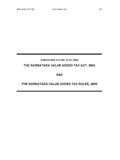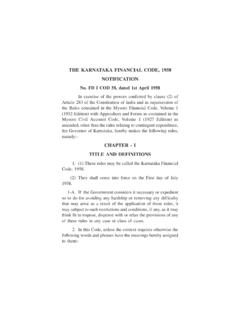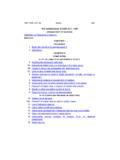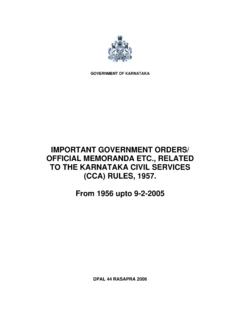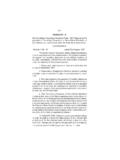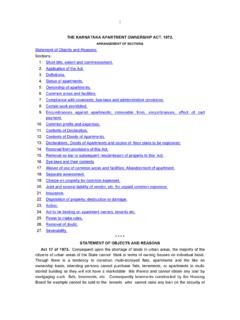Transcription of THE KARNATAKA INDUSTRIAL ESTABLISHMENTS …
1 THE KARNATAKA INDUSTRIAL ESTABLISHMENTS ( national AND FESTIVAL HOLIDAYS) ACT, 1963 ARRANGEMENT OF SECTIONS Statement of Object and Reasons Sections: 1. Short title, extent and commencement. 2. Definitions. 3. Grant of national and festival holidays. 3A. Grant of Holidays on the polling day, for House of the people or to the State Legislative Assembly. 4. Employer to send statement to Inspector. 5. Wages. 6. Inspectors. 7. Powers of Inspectors. 8. Penalties. 9. Penalty for obstructing Inspectors. 9A. Cognisance of offences. 10. Exemptions. 11. Rights and privileges under other laws, etc., not affected. 11A. Power of State Government to amend the Schedule.
2 12. Power to make rules. 13. Rules and notifications to be laid before the State Legislature. SCHEDULE. * * * * STATEMENT OF OBJECTS AND REASONS I Act 24 of At present there is no uniform practice in the several INDUSTRIAL undertakings of the State to declare national and Festival Holidays every year. It is also likely that some of the private INDUSTRIAL ESTABLISHMENTS are declaring such holidays as paid holidays in spite of the fact that the Government issues Press Notes requesting all the INDUSTRIAL undertakings of the State, to prescribe Republic Day on 26th January and Independence Day on 15th August each year as additional paid holiday and not as substituted holidays.
3 As the Government of India have requested that appropriate action should be taken to enforce the observance of national and Festival Holidays as holidays with wages and in view of the great importance attached to the national and some other important festivals, it is considered necessary that our State should have legislation in this behalf. Hence this Bill. (Published in KARNATAKA Gazette (Extraordinary) Part IV-2A, dated 5th December 1962 as No. 244 at page. 7.) 2II Amending Act 1 of 1975. Under section 3 of the Mysore INDUSTRIAL ESTABLISHMENTS ( national and Festival Holidays) Act, 1963 every employee is allowed two national holidays in a calendar year on the 26th January and the 15th August.
4 It is proposed, as suggested by the national Commission on Labour, to provide for another national holiday on the 2nd October (Mahatma Gandhi s Birthday). Under the proviso to sub-section (3) of section 5 of the Act, an employee will not be entitled to be paid any wages for any of the holidays allowed, if he has nor completed period of thirty days continuous service immediately preceding such holiday. This will mean hardship in cases where an employee though he may have completed a period of thirty days of service, may not have completed thirty days of continuous service immediately preceding the holiday. It is therefore proposed to amend the proviso providing for the requirement of a total period of thirty day s service within a continuous period of ninety days immediately preceding the holiday.
5 It is also proposed to provide that offences under the Act or rules shall be taken cognisance only upon complaint and by a magistrate of the first class. Hence this Bill. (Published in KARNATAKA Gazette (Extraordinary) Part IV-2A dated 14th March 1973 as No. 255 at page. 4.) III Amending Act 7 of 1985. In his Budget Speech during 1982, the Chief Minister announced Government s intention to declare the 1st day of May as a paid holiday for INDUSTRIAL workers in the State. When the Government of India were approached for obtaining the previous instructions of the President for amending section 3 of the KARNATAKA INDUSTRIAL ESTABLISHMENTS ( national and Festival Holidays) Act, 1963, they informed that they were not agreeable to the day being declared a holiday in respect of ESTABLISHMENTS owned or controlled by the Government of India.
6 It is therefore considered necessary to declare 1st day of May as a paid holiday for INDUSTRIAL workers in the State of KARNATAKA except in respect of ESTABLISHMENTS owned or controlled by Government of India. Hence the Bill. (Published in KARNATAKA Gazette (Extraordinary) Part IV-2A dated 20th March, 1985, as No. 166 at page. 3.) IV Amending Act 16 of 1986. The power conferred by section 6 of the KARNATAKA INDUSTRIAL ESTABLISHMENTS ( national and Festival Holidays) Act, 1963 is, at present confined to the appointment of Inspectors for local limits specified by the State Government. It is intended to take power to appoint Inspectors for any given INDUSTRIAL establishment or class of such ESTABLISHMENTS .
7 Where the power so conferred is exercised, provision for cessure of jurisdiction by the Inspectors appointed for local limits in respect of such ESTABLISHMENTS is also required to be provided for. It is also necessary to clear the ambiguity in section 3 and make a few consequential amendments. Hence the Bill. 3(Published in KARNATAKA Gazette (Extraordinary) Part IV-2A, dated 3rd February, 1986 as No. 70 at page. 4.) V Amending Act 28 of 1997. On the suggestions of the Election Commission, it is proposed to amend the KARNATAKA INDUSTRIAL ESTABLISHMENTS ( national and Festival Holidays) Act, 1963, to make it obligatory on the part of employers to allow paid holiday to workers during general or bye-elections for any parliamentary or Assembly Constituency under the Representation of Peoples Act, 1951 (Central Act 43 of 1951) to enable the employees to exercise their franchise.
8 It is prosed to allow the employer and employee to choose paid holidays out of the list of festivals specified in the schedule. Hence the Bill. (Obtained from LAW 18 LGN 97.) * * * * 41[ KARNATAKA ACT]1 No. 24 OF 1963 (First published in the 1[ KARNATAKA Gazette]1 on the Eleventh day of July, 1963.) THE 1[ KARNATAKA ]1 INDUSTRIAL ESTABLISHMENTS ( national AND FESTIVAL HOLIDAYS) ACT, 1963 (Received the assent of the President on the Twenty-sixth day of June, 1963.) (As amended by Act 1 of 1975, 7 of 1985, 16 of 1986 and 28 of 1997) An Act to provide for the grant of national and festival holidays to persons employed in INDUSTRIAL ESTABLISHMENTS in the 1[State of KARNATAKA ]1.
9 WHEREAS it is expedient to provide for the grant of national and festival holidays to persons employed in INDUSTRIAL ESTABLISHMENTS in the 1[State of KARNATAKA ]1; BE it enacted by the 1[ KARNATAKA ]1 State Legislature in the Fourteenth Year of the Republic of India as follows: 1. Adapted by the KARNATAKA Adaptations of Laws Order 1973 1. Short title, extent and commencement. (1) This Act may be called the 1[ KARNATAKA ]1 INDUSTRIAL ESTABLISHMENTS ( national and Festival Holidays) Act, 1963. 1. Adapted by the KARNATAKA Adaptations of Laws Order 1973 (2) It extends to the whole of the 1[State of KARNATAKA ]1. 1. Adapted by the KARNATAKA Adaptations of Laws Order 1973 (3) It shall come into force on such 1[date]1 as the State Government may, by notification, appoint.
10 1. Act came into force by notification. Text of the notification is at the end of the Act 2. Definitions. In this Act, unless the context otherwise requires, (1) day means a period of twenty-four hours beginning at midnight; (2) employee means, (i) any person (including an apprentice) employed in any INDUSTRIAL establishment to do any skilled or unskilled, manual, supervisory, technical or clerical work for hire or reward, whether the terms of employment be express or implied; (ii) any other person employed in any INDUSTRIAL establishment whom the State Government may, by notification, declare to be an employee for the purposes of this Act; (3) employer , when used in relation to an INDUSTRIAL establishment , means a person who has the ultimate control over the affairs of any INDUSTRIAL establishment and where the affairs of any INDUSTRIAL establishment are entrusted to any other person (whether called a managing agent, manager, superintendent or by any other name) such other person; (4) INDUSTRIAL establishment means, (i) any shop or commercial establishment as defined in clauses (e) and (u) of section 2 of the 1[ KARNATAKA ]1 Shops and Commercial ESTABLISHMENTS Act, 1961; 1.
